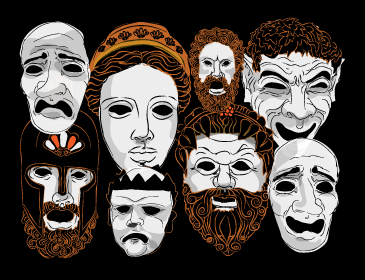Why Masks in Theatre WORK
August 2020
ACTING WITH MASKS IN THE COVID-19 ERA
Here at MTC we strive to give our students the most educational, fun, and professional theatre experience possible. In the era of COVID-19, we have put in place health and safety protocols to keep both faculty and students safe while maintaining the MTC School experience you have come to know and love. One of these protocols includes wearing a mask, which for many, may be a turn off the parent and/or the actor. We understand this, but are here to tell you that we promise that wearing a mask will not negatively impact your child’s time here and in fact, it might even provide them something entirely new that they will love!
Artist rendition of Greek Theatre Masks. Masks were constructed out of lightweight materials such as wood, linen, cork, and sometimes real hair. Unfortunately, they lacked durability, and none have survived.
(Source: http://artsedge.kennedy-center.org/)
You see, masks in theatre is nothing out of the ordinary. In fact, actors wearing masks dates all the way back to 532 BC when the ancient Greeks wore them in their plays! These masks covered the actor’s whole face, unlike the masks we’ll be wearing here at MTC, but they were used to express the most obvious parts of the character including personality, social class, occupation, emotion, and more. More recently, and by recently we mean the 16th century, there was the well-known Commedia dell’arte, originating from Italy and lasting all the way until the 18th century. Similar to the Greeks, Commedia dell’arte characters usually represented social types and stock characters. These characters included a foolish old man, a not-so-smart military general, a trickster who was born to stir up trouble, and many others. While technically different people in every show, the masks used represented these stock characters so that right away, the audience knew who the character was without having to be re-introduced to their personality. It allowed more time for storytelling and less time for meeting and developing characters. And just to really send this idea of masks in theatre home, think of the symbol for so many theatres and drama programs…it’s a comedy and tragedy mask! (originated by the ancient Greeks)
Commedia dell’arte masks. Masks were usually made of leather and were mostly phased out towards the end of Commedia Dell'Arte's popularity.
(Source: http://italian-renaissance-theatre.weebly.com/)
This coming Fall Term, we hope to implement masks not only as a safety precaution, but as a way to teach our students about a type of theatre that may be completely new to them! If you’re wondering how masks can be used, we’ll give an example. One activity some classes will be partaking in, is mask designing. We will provide the students masks that they can draw on and color as they wish. Then, with their newly designed masks, they will be asked to decide what kind of character would wear a mask like that, and how might that character interact with the world around them, and what might this character want? Masks in general also force actors to be more physical, which is always important even when actors aren’t wearing masks. On stage, actors are always told to be bigger, meaning they need to show more emotion and more physicality through their actions, because on stage, small movement often doesn’t translate to the audience, especially to those in the back row. With a mask, an actor has no choice but to be big! It’s always easier to tell an actor to take it down a level then to bring it up, and wearing a mask provides this perfect opportunity for improvement.
In conclusion, some would say that theatre was meant to be worn with masks, as this is how it started. Of course, we don’t necessarily believe that, but we do agree that masks can help enhance a theatrical experience and in the case of MTC School, teach our students something new in a way that has existed since the birth of theatre.
Interested in more resources addressing masks in theatre? Well, we’ve listed some below!
We hope to see your child at MTC this fall, whether it be here in our theatre or online in one of our virtual classes. Info and registration can be found here: https://www.musictheatreofct.com/classes-productions.
Stay safe and be well,
The MTC Staff and Faculty
Articles about Masks in Theatre:
Commedia dell’arte – From The Metropolitan Museum of Art (written in 2007)
13 Things – The Greek Mask – From Brown University (written in 2009)
Classroom and Rehearsal: Mask Work Can Free the Actor’s Body (written in 2013)
The Art and Alchemy of Mask Theatre (written in 2016)
The Benefits of Using Masks in the Classroom (written in 2018)


